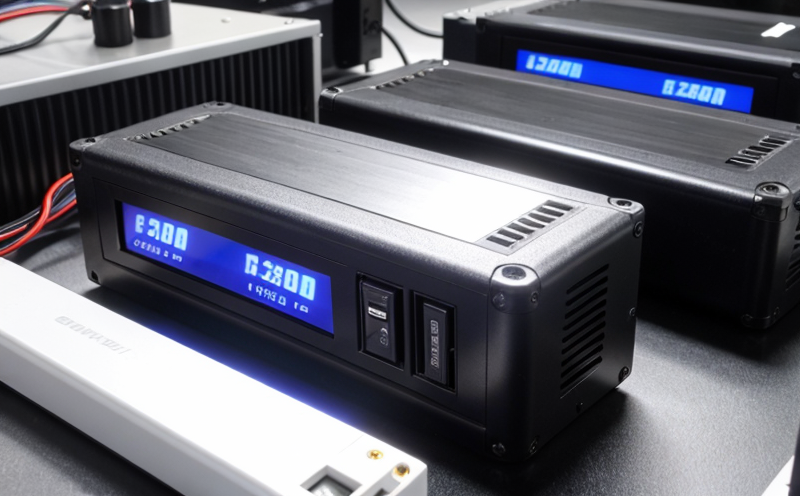ASTM F2878 Battery Performance Testing for Medical Device Applications
The ASTM F2878 standard provides a comprehensive framework for evaluating the performance of batteries intended for use in medical devices. This service is particularly critical as it ensures that the batteries meet stringent safety, reliability, and performance requirements necessary for successful integration into life-saving equipment.
Battery performance can significantly impact patient safety and device functionality. In medical applications, such as pacemakers, insulin pumps, and surgical instruments, battery failures could lead to severe health risks or even fatalities. ASTM F2878 addresses this by defining standardized test methods that simulate real-world conditions under which the batteries will operate.
The standard covers a wide range of tests including charge acceptance, capacity retention, self-discharge rate, internal resistance measurement, and accelerated life testing (ALT). These tests are designed to assess not only how well the battery performs during initial use but also its long-term stability. By adhering to ASTM F2878, manufacturers can demonstrate compliance with international standards while enhancing their product’s reliability.
One of the key aspects of this service involves understanding the unique challenges associated with medical device batteries. These include maintaining consistent performance over extended periods, operating under extreme temperatures, and enduring frequent charge-discharge cycles. The tests outlined in ASTM F2878 account for these factors by simulating various environmental stressors that could affect battery integrity.
Another important element is the preparation of test specimens according to precise specifications laid out in ASTM F2878. This ensures uniformity across samples, which is crucial for accurate results and reproducibility. Specimen preparation includes conditioning the batteries at specified temperatures and humidities before conducting any tests.
The instrumentation used in this testing process plays a vital role in ensuring accuracy and reliability of the test outcomes. High-precision equipment capable of measuring minute changes in voltage, current, temperature, and other critical parameters is essential. Additionally, specialized software tools are employed to analyze data collected during each test run, providing detailed insights into battery behavior under different conditions.
Reporting plays a significant part in this service as well. Results from ASTM F2878 testing must be documented meticulously, including all relevant measurements and observations. Compliance with the standard also requires clear statements regarding whether or not the tested batteries meet its specified criteria for performance. This documentation serves multiple purposes: it helps manufacturers improve their products; allows regulatory bodies to assess compliance easily; and provides assurance to end-users about product safety.
By leveraging ASTM F2878, organizations involved in developing medical devices can gain confidence that they are producing reliable battery systems capable of delivering consistent performance throughout the expected lifespan. This not only enhances overall product quality but also supports broader goals related to patient care and safety within healthcare settings.
Why It Matters
The importance of ASTM F2878 cannot be overstated, especially when considering its role in ensuring the safe and effective operation of medical devices powered by batteries. Compliance with this standard is essential for several reasons:
- Regulatory Requirements: Many countries around the world require manufacturers to comply with internationally recognized standards like ASTM F2878 before approving their products for sale.
- Patient Safety: Ensuring that batteries function correctly reduces risks associated with potential failures, thereby protecting patients' health and well-being.
- Product Reliability: Rigorous testing helps identify weaknesses early on in the development process, allowing for improvements before mass production begins. This leads to more dependable products overall.
- Market Access: Adhering to global standards opens doors to international markets where adherence is mandatory.
In summary, ASTM F2878 battery performance testing is crucial because it contributes directly towards improving the quality and safety of medical devices used in various healthcare settings. It ensures that these devices perform reliably under diverse operational conditions, thus supporting better patient outcomes while fostering trust among stakeholders involved in their design, production, and use.
Eurolab Advantages
At Eurolab, we understand the critical nature of ASTM F2878 battery performance testing for medical device applications. Our expertise lies in providing top-tier services that meet or exceed industry expectations. Here’s why choosing Eurolab for your battery testing needs is advantageous:
- Comprehensive Testing Capabilities: We offer a full suite of tests aligned with ASTM F2878, ensuring thorough evaluation of all relevant parameters.
- Expert Staff: Our team comprises highly skilled professionals who possess extensive knowledge and experience in the field of medical device battery testing.
- State-of-the-Art Facilities: Equipped with cutting-edge laboratory equipment tailored specifically for ASTM F2878 compliance, we guarantee precise and reliable results.
- Custom Solutions: Recognizing that every project has unique requirements, Eurolab provides customized testing plans to suit individual needs.
- Fast Turnaround Times: By streamlining our processes, we can deliver timely reports without compromising quality.
In addition to these advantages, Eurolab maintains strict adherence to international standards such as ISO 13485 and EN 60601-2-29, further enhancing the credibility of our services. With us, you get more than just testing; you receive comprehensive support tailored specifically for your business objectives.
Competitive Advantage and Market Impact
Adhering to ASTM F2878 provides a significant competitive edge by ensuring that medical device batteries perform reliably under various conditions. This standardization contributes directly to enhancing patient safety, which is paramount in the healthcare sector.
- Innovation: By meeting these stringent requirements early on, companies can innovate confidently knowing their products will meet regulatory expectations.
- Competitive Positioning: Demonstrating commitment to high-quality standards positions firms favorably against competitors who may not adhere as closely to such protocols.
- Customer Trust: Ensuring reliable battery performance builds trust among healthcare providers and end-users, leading to increased market share.
The broader implications extend beyond individual companies; they contribute positively to the entire medical device industry by promoting consistent quality across all products. This collective improvement supports advancements in technology and therapy delivery methods, ultimately benefiting public health worldwide.





